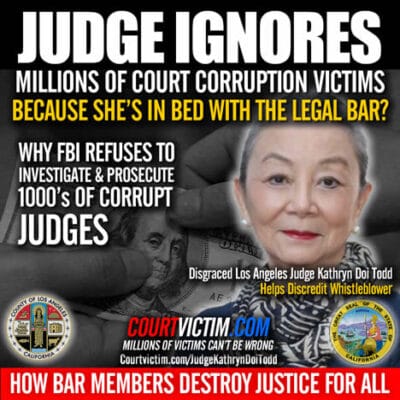Corrupt Judge Kathryn Doi Todd

Corrupt Judge Kathryn Doi Todd #47691 Admitted Los Angeles January 1971 Kathryn Doi Todd was a judge on the Second District, Division Two of the California Courts of Appeal. She was appointed to this position by former Governor Davis on August 1, 2000. She was retained by the November 5, 2002 and the January 6, 2003 elections. Todd retired from the court on January 22, 2013 after 35 years in judicial service. When she was appointed to the Los Angeles Municipal Court in 1978, she was the first Asian-American female judge in the country. Education Justice Todd graduated with a history degree from Stanford University in 1963 and went on to graduate from Loyola Law School in 1970. Career Justice Todd began her legal career with a general civil practice in Los Angeles. She was appointed to the Los Angeles Municipal Court by former Governor Brown in 1978. In 1981, she was appointed to the Los Angeles Superior Court. In 1978, Governor Jerry Brown appointed her to the Los Angeles County Municipal Court, making her the first female Asian American judge in the United States. In 1981, Brown elevated Todd to the Los Angeles County Superior Court, a position she would hold until when Brown’s former chief of staff, Governor Gray Davis, appointed her to the California Second District Court of Appeal, Division Two as of August 18, 2000. Doi retired from the bench in January 2013. Preceded by John Zebrowski Associate Justice of the California Court of Appeal, Second District, Division Two 2000–2013 Kathryn Doi Todd Retires From Court of Appeal January 23, 2013 Justice Kathryn Doi Todd of this district’s Court of Appeal, Div. Two retired yesterday after 35 years in judicial office, including more than 12 years… Read More




